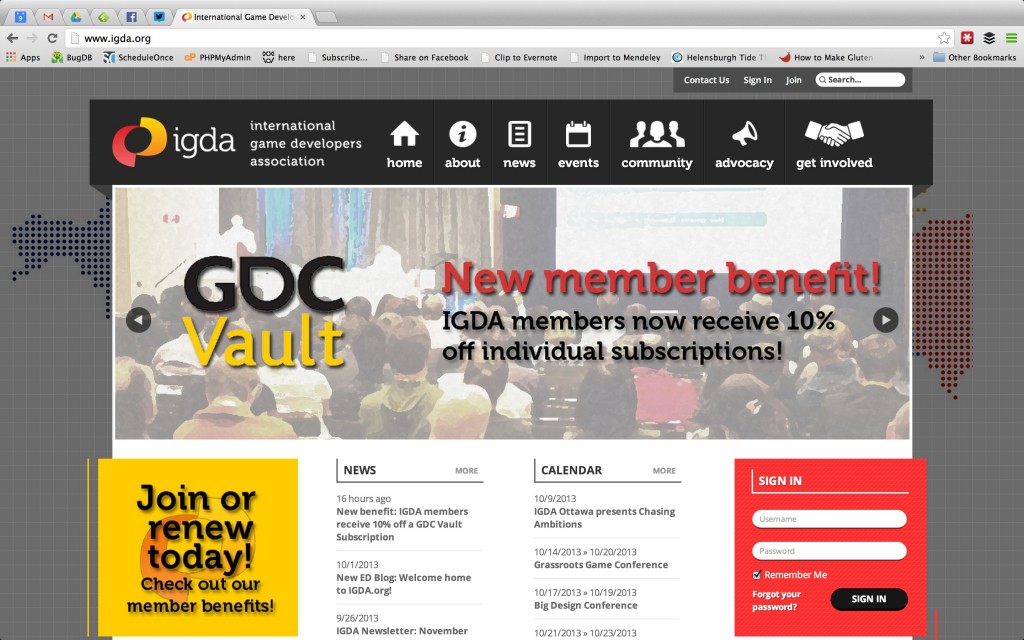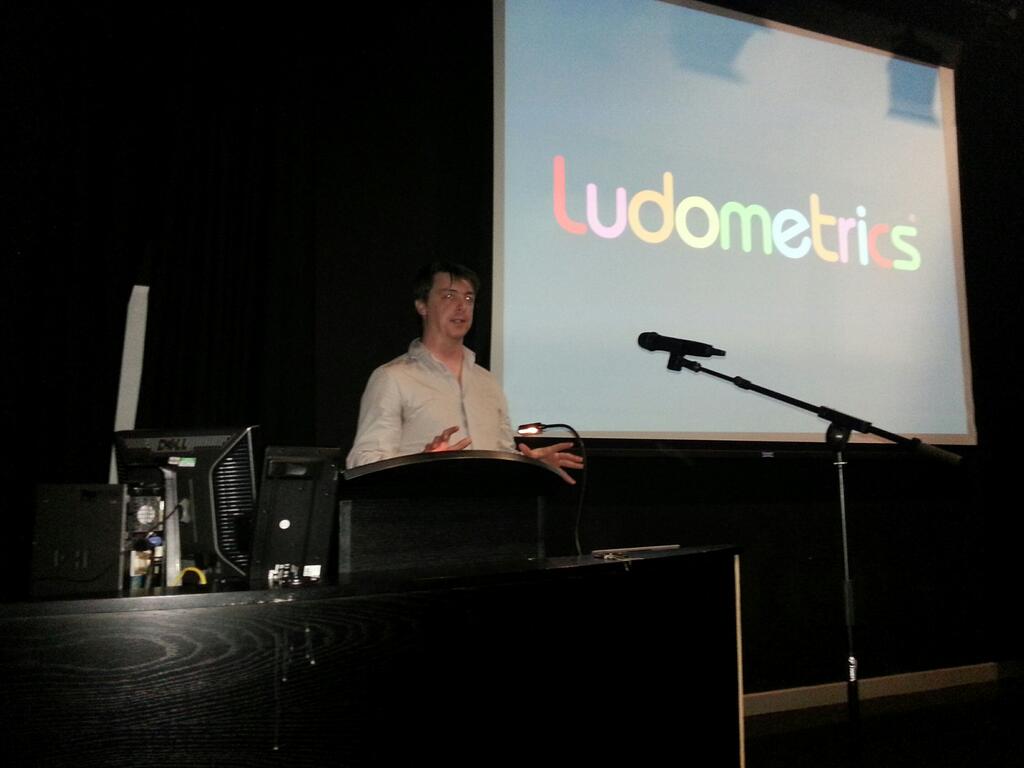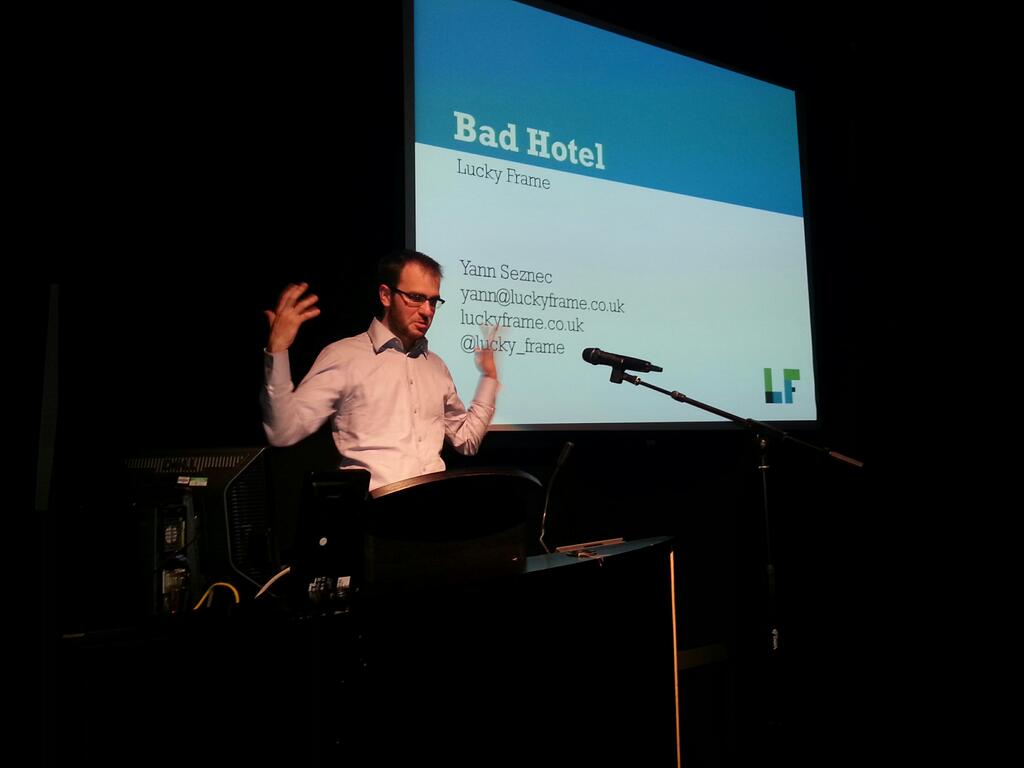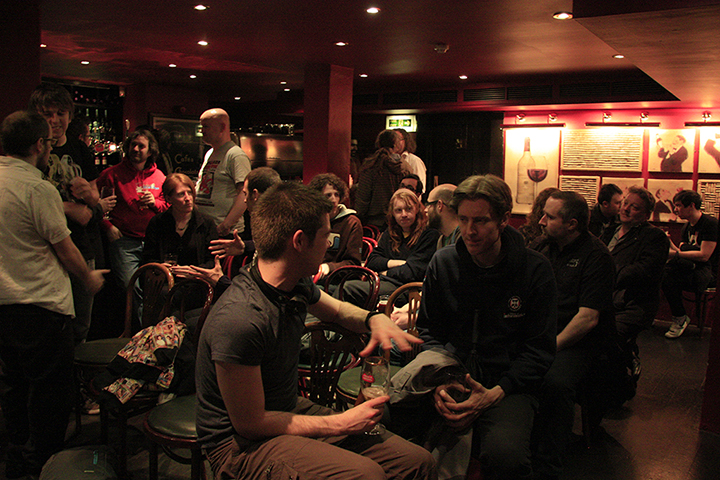Simply put, the Job Board is an online, free resource where people can advertise positions they have available. In contrast to a lot of similar offerings, we also have taken great care to not only include provision for paid positions but also to allow hobbyist and student teams to advertise positions on their projects.
We will be moderating the board to ensure that the content remains of relevance to the IGDA Scotland community. We won’t be requiring that the position be in Scotland, because ultimately our community bleeds slightly south of the border in some places anyhow, but we will be ensuring that the content is policed.
We’re just starting out with this, and our policies are liable to change over time, but we hope that you will all find this new addition to the IGDA Scotland services useful! Bookmark and keep an eye on http://jobs.igdascotland.org, let us know in the comments what you’d like to see from this resource in the future and please please spread the word!
]]>Sold Out!
Our meeting in Edinburgh attracted a great crowd and was fully sold-out. This is by far the biggest event we’ve had since we moved to the TechCube, and if this keeps up, we may have to look for a bigger home in future! Thanks to everyone who came out, and the volunteers who made it happen!
A New Look for IGDA.org
After years of struggling with a badly implemented and increasingly dilapidated website, we’ve had a complete facelift. There’s a lot more functionality still to come but I really hope you will visit and check it out!
GDC Vault Discount for Members
IGDA members are now eligible for a 10% discount off the price of a subscription to the GDC Vault. The Vault is one of the premier resources, where talks from GDC events going back to 1996 are housed. For the past few years, every talk at every event has been recorded, and the only way to access all of them is on the Vault. For those who can afford it, a subscription to the GDC Vault can be the single best resource available, and with the discount available to IGDA members, you can immediately get the price of your membership back with this one discount. Members can find the discount code here.
Announcing Partnership with WhoActually.com
A new partner for the IGDA, WhoActually is a UK company dedicated to the notion of ensuring that the creatives who make the products we all enjoy get proper recognition. WhoActually.com allows you to create a profile – which, as an IGDA member will carry a special badge to highlight your membership – and then add your credits. “Works” are the term they use for the products, so you can look up your favourite games, films and other things to find out who contributed to them, what their role was and hopefully some insight into what they actually did as part of the team. WhoActually is all about making sure that we get the credit we deserve!
Rift-Share – A New Reality for Developers
One thing that we realised in the run-up to our Edinburgh meeting is that although there are only so many Oculus Rift devices in the community, there is a lot more enthusiasm for them. We also recognise that beyond debug and testing, a lot of development can actually be done without constant access to the Rift hardware. Rift-Share is a program we launched last night to empower developers to work on the hardware by offering testing and time on the devices that would otherwise be sat idle. We’ll have more info on this program very shortly, but we’re very excited about it!
Jobs@IGDA Scotland
We’ve also found lately that a lot people are wanting to advertise their positions through the IGDA chapter. That’s an excellent thing for the community, but it can lead to a lot of clutter on the Facebook group, so before the end of the month we’ll be rolling out a jobs board, so that the community can advertise positions vacant within Scotland, and you can all see where and how to apply – and best of all, this will be a free resource, run by the community, for the community. Again, we’ll be getting more information out about this very shortly!
Launch Conference and the Launch Awards
Our friends down in Birmingham at the Launch Conference have asked us to highlight both their event, which will be taking place 21st and 22nd November as well as their Awards. They specifically asked us to invite members of our community to apply for the awards, and where necessary they are open to pitches over Skype rather than in person! Please make sure to check out the event.
Volunteers
As always, we are desperately in need of volunteers to make things happen. We are a 100% volunteer driven organsiation, and without people helping out, very little would be accomplished. We regularly ask the volunteers for help with aspects of the organisation that we need assistance with, but increasingly, we are asking the volunteers what it is they would like to do, and then empowering them to do it. Find out more here!
Next Events
The AGM will be taking place in Glasgow on the 13th November in the Admiral Bar. It will be a great way to end the year by recapping all of the hard work done by the chapter in 2013 and welcoming the new board members to the group.
On 4th December, University of West of Scotland and West College Scotland, in association with IGDA Scotland, will be hosting an event called “GamesWest – Get into GameDev” targeting students in Further and Higher Education. A more detailed post about this will be coming soon.
Finally, we will be again collaborating with organisations and institutions around the country to deliver an amazing Global Game Jam experience for you all again this January, so make sure to save the dates: 24th – 26th January
]]>Thanks as always to everyone who made this an absolutely brilliant night, from the speakers, to the volunteers, the audience who packed out the venue – and of course not forgetting The University of Abertay, Dundee who provided the venue.
You can find the videos embedded below, or pay a visit to our Youtube page, where you can find recordings from this meeting as well as many of our others.
Bips! – David Thomson, Ludometrics
Bad Hotel – Yann Seznec, Lucky Frame
HTML 5 – Sandy Duncan, YoYo Games
]]>
Elections are an important way for the members of the organisation to determine who is going to run things. It’s an opportunity to make changes to the team that represents your interests to make sure that they are adequately taken care of, and they’re also an excellent way to get more involved with the chapter and help to shape our future.
You can read the full information about the election process here, but here is a short sumary:
- September 13th:
- Call for nominations opens.
- October 9th:
- Nominations closed. All nominations must be received by this date.
- Must be a member by this date to participate in the vote.
- October 10th
- Distribute Election Materials to members
- November 6th:
- Deadline for votes
In order to nominate yourself as a candidate for election, you have to be an IGDA member in good standing with voting rights (i.e. a professional member, not a student member). You must also agree to be bound by the IGDA Scotland Bylaws, and also have read the Election Procedures Policy for the 2013 election. Then all you need to do is to email [email protected] and let us know that you intend to stand, including your 400 word candidate statement.
]]>
 We’re really happy to announce that the IGDA Scotland Board of Directors, in concert with the IGDA’s Executive Director Kate Edwards, ratified a set of Bylaws that will govern our chapter.
We’re really happy to announce that the IGDA Scotland Board of Directors, in concert with the IGDA’s Executive Director Kate Edwards, ratified a set of Bylaws that will govern our chapter.
We’re indebted to our sister chapter IGDA Boston who drafted the model Bylaws that we used as a starting point, and to Kate for working with us and supplying insight.
What will this change?
Fundamentally, nothing will change. What it means is that we have a clear set of guidelines as to what members should expect from the board, and how the board should operate. However, there are no sweeping changes, and we’ve tailored the model Bylaws to more closely match the way things have been working in IGDA Scotland. We’ve also used some of the items that the model addressed to tighten up those processes, using the experiences that Boston in particular, but other chapters as well, to make our chapter stronger.
Why is this important?
As we run up to the end of the first “term” of the Board, and especially now that we’re getting much more established as a chapter, we need to set down how things are going to work – for instance, without the Bylaws, we don’t even have a length of time written down that the Board members are supposed to serve for! Laying out a framework ensures that the chapter has a solid foundation for the future, which is vital.
Additionally, being a body that actively serves and represents Game Developers in Scotland, having this kind of approach provides clarity and transparency to the community, aspects that are very important for an organisation to have any sort of legitimacy to its members.
Why has it taken 2 years if it’s so important?
We’ve been working on a lot of other things, and among the Board, we all previously had an understanding that the “model” Bylaws provided by the IGDA were a good template, so we worked according to those. It wasn’t a priority until we got close to holding elections, since the Bylaws set out expectations and even determine the election process we’ll be using (in so much as they force us to adopt one). These are all things that we could let slide previously but are going to be critically important going forward, and for this reason it’s not been a priority until now.
You can read IGDA Scotland’s Bylaws here.
]]>
Please enjoy “Life of Play, Life of the Mind – What Game Design Can Teach Us”
]]>
In this post, IGDA Scotland volunteer Jamey Stevenson summarises the special event held on 2nd July in association with Glasgow Caledonian University in which Richard Lemarchand, former Lead Designer at Naughty Dog presented a Masterclass titled “Life of Play, Life of the Mind: What Game Design Can Teach Us”.
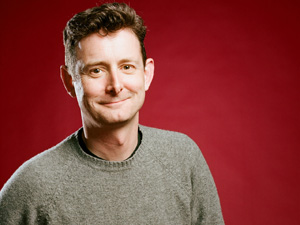 Earlier this month, Glasgow Caledonian University played host to game industry veteran Richard Lemarchand, who delivered an articulate and enlightening masterclass, presented in partnership with IGDA Scotland. The event garnered a huge turnout; the GCU lecture hall in which it was held was packed to the rafters with enthusiastic attendees. Judging from the quick survey conducted by Richard at the start of his talk, it was also quite a diverse audience – one that included educators, students, professional developers, and hobbyists alike.
Earlier this month, Glasgow Caledonian University played host to game industry veteran Richard Lemarchand, who delivered an articulate and enlightening masterclass, presented in partnership with IGDA Scotland. The event garnered a huge turnout; the GCU lecture hall in which it was held was packed to the rafters with enthusiastic attendees. Judging from the quick survey conducted by Richard at the start of his talk, it was also quite a diverse audience – one that included educators, students, professional developers, and hobbyists alike.
For those familiar with Richard’s background, it will perhaps come as no surprise that the crowd he draws is such a heterogeneous group. Professional game makers often talk about “bridging the divide” between industry and academia, and it seems that the perceived gulf between the two camps can often appear equally daunting from either side. But Richard’s own journey has now taken him across that gap and found him not only surviving the transition, but loving every minute it. Whether as Lead Designer of the acclaimed Uncharted series at Naughty Dog, or in his current position as a Professor of Game Design at the venerable USC interactive media program, Richard has managed to achieve success on both sides of the purported industry/academia boundary, seemingly with with minimal hand-wringing along the way.
One of the recurring themes of Richard’s talk was the benefit of being “interested in everything”, and how maintaining an abiding spirit of curiosity can serve to enrich one’s life. He identified this same open-minded, exploratory approach to the world as an essential skill for game designers to cultivate. The overarching subject of the presentation was the many ways in which the skills that had proven most essential to Richard’s evolution as a game designer were also highly applicable to his current role as a teacher. This topic was illustrated via a personal tour of Richard’s career, from his enduring fascination with indie and art games, to his role in shaping AAA blockbusters, and an intriguing glimpse into the methods used to teach game design at USC.
Despite the fact that his message included many pearls of wisdom for both aspiring and experienced game developers, the underlying basis for the talk was much more humanistic. While the notion of a “Masterclass” might have easily been misconstrued to imply a sort of forbidding, “elites only” mentality, the atmosphere that Richard created could not have been more warm and inviting. Throughout the talk, he displayed a readily apparent knack for conveying information with a tone that was inclusive enough to accommodate those with little more than passing knowledge of digital games. It was enough to make me envious of his students!
In keeping with his holistic approach to games and learning, the mix of concepts Richard covered was incredibly expansive: everything from homebrew and zine culture, Fluxus, flow, playtesting and prototoyping was included in the discussion. There were far too many compelling ideas whirling around to be listed here, but a few other personal highlights included:
- Finding out what books constitute the “core texts” of the USC program: Game Design Workshop and Rules of Play, certainly a solid foundation for teaching design fundamentals
- Hearing Richard’s take on the most useful subjects for game designers to study (systems design and human psychology got shout outs)
- Richard’s pragmatic, thoughtful stances on recurring debates like whether games are art and whether it’s truly possible to teach creative skills like game design (short answer: yes to both, but with a lot of nuance)
- The similarities between being a teacher and a Dungeon Master
- The concept of “vulnerability” in Uncharted, and how it informed Richard’s teaching style
 Overall, it was a highly informative and engaging lecture from the newly graduated Doctor Lemarchand. Please join us in congratulating Richard on receipt of an Honorary Degree of Doctor of Technology from Glasgow Caledonian University. We’d also like express our thanks to GCU for their assistance arranging this special appearance from such a talented speaker. Those who didn’t attend definitely missed out on something special. But don’t fret! Video of the session is expected to be available shortly, and there are plenty more great events coming your way in the near future courtesy of IGDA Scotland, so keep watching this space.
Overall, it was a highly informative and engaging lecture from the newly graduated Doctor Lemarchand. Please join us in congratulating Richard on receipt of an Honorary Degree of Doctor of Technology from Glasgow Caledonian University. We’d also like express our thanks to GCU for their assistance arranging this special appearance from such a talented speaker. Those who didn’t attend definitely missed out on something special. But don’t fret! Video of the session is expected to be available shortly, and there are plenty more great events coming your way in the near future courtesy of IGDA Scotland, so keep watching this space.
In August 2011, Brian Baglow did a session for us called “Developers: Stop Being Shit”. This talk went viral to game developers around the world, and went on to spawn one of the highest rated sessions at Develop in Brighton in 2012, although they did ask Brian to change the title.
In September 2011, we met in Glasgow and Interim Chapter Leader Kraig Walker gave a short session on the state of the chapter at that time, and where the chapter was heading.
The same night saw a session from long time friend of the chapter Daniel Livingstone of UWS presenting work undertaken by students using a unofficial Kinect SDK (this was in the days before the official SDK was released).
Brian Hackett of Claymore Games gave a presentation as well, covering the way that they transitioned from developing using Java to moving to the iOS platform.
In April of 2012, Chapter Leader Brian McDonald gave a short talk about the first year of operation for the chapter, how things had progressed and what we were looking to do in the future.
We’ll be posting more videos of more recent talks, as well as getting more of our meetings recorded. Thanks to everyone for their continued support, and to the volunteers who have recorded and edited these sessions together.
]]>In this post, IGDA Scotland volunteer Finlay Thewlis recaps the chapter meeting held June 12th in the Hannah Maclure Centre, Dundee. Thanks as always to our excellent sponsors in Dundee – The University of Abertay Dundee, and of course to our excellent speakers without whom this event would not have been such a great success!
Opening the IGDA Dundee meeting was Luke Dicken who told us that we had SOLD OUT of spaces at the meeting! That certainly shows an appetite for all things IGDA. Various other aspects showed how the ball is really rolling with IGDA Scotland now, such as the Chapter’s progression and a number of special events which are coming up. We then moved onto the regular Open Mic part of the evening which contained a myriad of awesome job vacancies, networking opportunities and attendees with games they wanted to share with everyone. It was great example of the openness within Scotland’s developer community and appetite to contribute and share.
David Thomson of Ludometrics then gave the first talk in the ‘Post Mortem’ style which always gives fellow developers and games types the frank and honest assessment of what went well and where mistakes were made. Bips was what David coined as a ‘Dave-Wave’, although in this case he wasn’t referring to spark of a concept from himself but in fact one of the Godfathers of the Scottish Games Industry, Dave Jones. The project came with an additional aim where the ever-unique Denki wanted to try out some new production/design processes and this was an ideal opportunity to do it.
The main aspect of the insightful post-mortem was that you need to tailor your development processes to your team and your project, square shapes won’t fit into a circular gap so don’t feel forced into having to accept a process or development method that you aren’t convinced is right for your respective project/team.
Yann Seznec from Lucky Frame was next up and he gave a session mainly deconstructing their iOS game Bad Hotel. There was a distinction right from the off from Yann that “we’re a ‘Creative Studio’ not just a games studio”, I think underlining the idea of ‘what makes a game a game?’ and that developers shouldn’t rule themselves out of doing certain work if they don’t feel it qualifies in their pre-conceptions of what they understand a game to be.
Overall Yann delivered a really bright and confident talk on the issues encountered in the development of Bad Hotel even going as far as to show us the game’s sales, revenues and background to the company’s operation. All these aspects constituted a talk that sheda lot of light on subjects many developers are instinctively quiet about and that was a major victory for the evening. It begs the question will there be a trend of developers becoming more increasingly open with aspects such as sales and their shortcomings?
Finally we had Sandy Duncan from YoYo Games who gave a decidedly more informal talk than the first two, refusing to give in to the oppression of PowerPoint having a worked at Microsoft in his past! Sandy took us through the background of YoYo and the origins of their GameMaker engine. Overall Sandy communicated how important he considers HTML5 as a platform and showed the strength of how timing of when a developer come into a market can be almost direction-changing when a platform or market opportunity is met with a prepared and able team there to take an idea forward. This can secure funding for projects that might not be considered by the masses of the games industry as not having any viability, at least yet.
The IGDA Scotland meeting in Dundee was a window into what makes the games industry in Scotland such a special place, the inclusiveness, warm, relaxed nature of the night and anyone hesitating to attend any IGDA meetings in any of the three locations we visit (Dundee, Glasgow & Edinburgh) should really get involved, it’s never too late to learn something helpful, meet someone new or find someone for that job vacancy you’ve been wanting to fill.
Don’t just watch this space, fill it!
]]>TL;DR – Please help out the chapter by volunteering to help us. Fill in this form.
In the past year at IGDA Scotland we’ve been fortunate to have some excellent people volunteering to help us out with our activities. Everything we do as a group is entirely based around people spending their own time to make it happen.
We’re grateful to those that have helped up until now, whether taking photos at events, checking people in at the door or helping us find and set up venues or even writing articles to keep our website up to date.
We need more people to step up and help out so that we can share the workload. For students it can be an excellent way of building up your CV with some community-oriented work (which also works really well on your IGDA Scholarships application). For professionals, it’s a great way to give something back to the community, as well allowing you to take a role in shaping that community.
